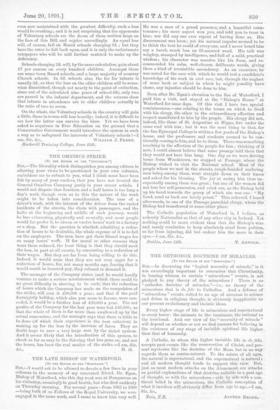THE OMNIBUS STRIKE.
[To TOR EDITOR OF THE "SPECTATOR."] SIR,—Tlio liberality which distinguishes you among editors in allowing your views to be questioned in your own columns, .emboldens me to submit to you, what I think must have been felt by many of your readers, that you have not treated the General Omnibus dompany justly in your recent article. I would not dispute that fourteen and a half hours is too long a clay's work, though even as to this the nature of the work ought to be taken into consideration. The ease of a driver's work, with the interest of the driver from the varied Incidents of the streets, the chats with passengers, and the halts at the beginning and middle of each journey, would be less exhausting, physically and mentally, and most people would far prefer it, to eleven or twelve hours' work in a factory or a shop. But the question is whethet, admitting a reduc- tion of hours to be desirable, the whole expense of it is to fall on the employers. The men have got their liberal wages for .so many hours' wol'Ic. If for moral or other reasons they want them reduced, the least thing is that they should meet the loss, in part at all events, by consenting to a reduction of their wages. But they are far from being willing to do this. Indeed, it would seem that they are not very eager for a reduction of hours, for, not many months ago, fearing that it would result in lessened pay, they refused to demand it.
The manager of the Company states (and he would hardly venture to make a serious misstatement which there could be no great difficulty in showing to be such) that the reduction of hours which the Company has made on the compulsion of the strike, will coat it 290,000 a year; and that if the paid fortnightly holiday, which also you seem to favour, were con- ceded, it would be a further loss of 220,000 a year. The net profits of the Company for the last year were but 245,000; so that the whole of them is far more than swallowed up by the actual concession ; and the manager says that there is little to be done (of which their experience is the best criterion) in making up for the loss by the increase of fares. They no doubt hope to save a very large sum by the ticket system. And it seems likely that the introduction of this system, to check as far as may be the thieving that has gone on, and not the hours, has been the real motive of the strike.—I am, Sir,
H. G.


































 Previous page
Previous page